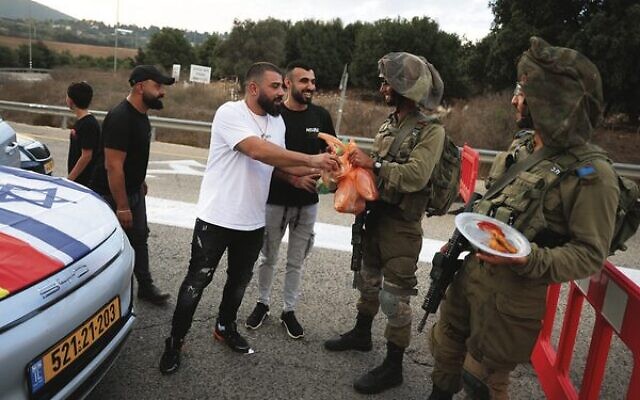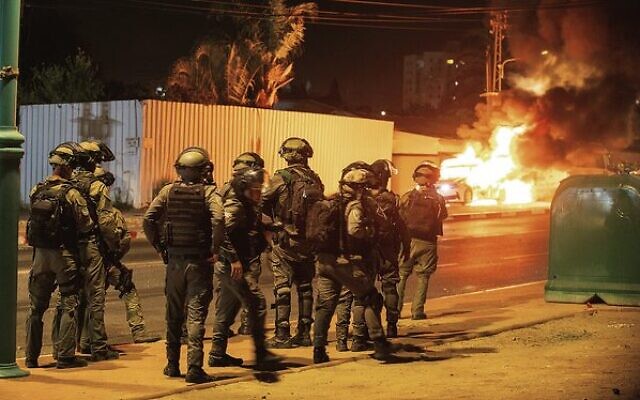To Hamas, all citizens are targets, say Arab Israelis
As Israel grapples with the escalating aftermath of Hamas's onslaught, Arab citizens share their shock, pain, loss – and some concern for a repeat of the 2021 riots, writes Gianluca Pacchiani.

(Times of Israel) – Awad Darawshe, a 23-year-old Arab Israeli paramedic, arrived at the scene of the massacre at the Supernova music festival on October 7 to treat the wounded. His friends begged him to leave the area, but he insisted on staying to perform his duty. He was killed by Hamas terrorists, who stole his ambulance and drove it into Gaza.
Darawshe’s story stands as a symbol of the contribution and sacrifice of members of Israel’s Arab minority in facing the deadly Hamas assault earlier this month.
“Arabs have been hurt by this attack in the same way as Jews. Not in the same numbers, but we have been targets too. Hamas also shoots rockets on Arab towns,” Shahira Shalaby, co-deputy director at the shared society non-profit Abraham Initiatives told The Times of Israel.
“We are in this together. Arabs have been shocked as much as Jews at the astonishing number of people killed, including small children, and of hostages taken. We are speechless,” added Shalaby, who had a short stint as Haifa deputy mayor in 2020.
“We do not justify this massacre in any way. We condemn it in the harshest possible manner. We are hurting as much as Jews. All boundaries have been crossed.”
Shalaby’s words were echoed by Jamal Alkirnawi, a social activist from Rahat, the largest Bedouin city in southern Israel.
“We are heartbroken. Those who were slaughtered were our friends and neighbours,” he said. “We have good relations with our Jewish communities along the Gaza border. Many Rahat residents work in agriculture in the kibbutzim. Some of them were killed in the fields on the morning of October 7.”
Shortly after the massive Hamas assault began, teams of Bedouin residents of the northern Negev launched search missions to locate missing people while Hamas terrorists were still roaming the area, Haaretz reported.
Hamas’s devastating attack has drawn widespread condemnation from Israel’s Arab citizens for its unprecedented brutality, though a few cases have emerged of public expressions of solidarity with Hamas, including seven university students who were suspended for social media posts supporting the terror group.
But mostly, Arabs and Jews have worked side by side to rescue the victims, treat the wounded, and keep the country running. Dozens of Arab Israelis were gunned down by Hamas terrorists, or killed by rockets fired on Israeli towns.
In 2009, Alkirnawi established “A New Dawn in the Negev,” a Bedouin-Jewish coexistence organisation. He put the number of Bedouins killed during the war at 18, of which at least five were from Rahat. His nonprofit has set up a “mobile situation room” to assist Bedouin families, particularly in unrecognised villages, to cope with the ongoing crisis by providing mental health assistance from psychologists and social workers.
“Bedouins occupy the lowest socioeconomic tier in Israeli society. Consequently, they are especially vulnerable in the current emergency. We are talking about tens of thousands of people – many of whom don’t have rocket shelters. In an unrecognised village, a family of four was directly hit by a Hamas rocket and died instantly,” said Alkirnawi, adding that eight Bedouins have so far been killed by missiles from Gaza.
The social activist, together with other volunteers from the area, opened a logistics centre in Segev Shalom, near Beersheba, to distribute supplies to families who have had to leave their homes, or who are in dire financial straits due to daily labourers not being able to work.
‘To a terrorist invading Israel, all citizens are targets’
Arabs make up around 22 per cent of the Israeli population. While they are citizens by law, many find it hard to identify with a country that explicitly defines itself as “Jewish”. Many feel they share a common history, language and national narrative with the other segments of the Palestinian people, in the West Bank, the Gaza Strip and the diaspora.
Nuseir Yassin, who has become an internet sensation in recent years thanks to his travel video blog “Nas Daily,” with 21 million followers on Facebook, wrote on X: “For the longest time, I struggled with my identity. Many of my friends refuse to this day to say the word ‘Israel’ and call themselves ‘Palestinian’ only. But since I was 12, that did not make sense to me. So I decided to mix the two and become a ‘Palestinian–Israeli.’ I thought this term reflected who I was. Palestinian first. Israeli second.”
The Dubai-based social media star said he had a “shock” after hearing news of the Hamas onslaught. “I realised that if Israel were to be ‘invaded’ like that again, we would not be safe. To a terrorist invading Israel, all citizens are targets.
“I do not want to live under a Palestinian government. Which means I only have one home, even if I’m not Jewish: Israel. That’s where all my family lives. That’s where I grew up. That’s the country I want to see continue to exist so I can exist. So from today forward, I view myself as an ‘Israeli-Palestinian’. Israeli first. Palestinian second,” he added.

Preventing a repeat of the 2021 clashes between Jews and Arabs
Besides the feelings of shock and horror at the senseless brutality, Arab Israelis are also wary of a repeat of the events of the Israel-Hamas war of May 2021, when violent clashes broke out between Arab and Jewish communities in several parts of the country, with lynchings taking place in a number of mixed cities against members of both groups.
“Nobody imagined then that such a thing could be possible. We are afraid that it might happen again,” former Haifa deputy mayor Shalaby said.
During a visit to Sderot the week after Hamas’s attack, National Security Minister Itamar Ben Gvir claimed inter-communal riots were “imminent”. But in spite of Ben Gvir’s claims, there have been no reports of clashes between Jews and Arabs in Israel since the onslaught and Israel’s declaration of war against Hamas. Local leaders in mixed cities seem to have learned the lesson from May 2021.
Akram Sakalla, an Arab member of the city council of Lod, a mixed city that witnessed violent confrontations between Arabs and Jews in 2021, confirmed that some lessons were learned. “The situation is quiet for now. There is a large police presence, patrols among the neighbourhoods in order to keep the quiet, and apparently the Shin Bet is also present, according to reports from the police itself and the city’s administration,” he said in an interview.
Lod mayor Yair Revivo said in a statement that the city’s administration was doing everything to keep the peace, adding, “We want to strongly convey the message that Arabs are not our enemies. Hamas is.” He praised residents for their efforts at solidarity and maintaining the city’s social fabric.
Sakalla said, “It is hard to predict at this point if violence will erupt. It will depend on how long the war in Gaza drags on, if it expands to the north, or, God forbid, if something happens on al-Aqsa.
“At this point, neither Jews nor Arabs are interested in an iteration of the 2021 riots. Ben Gvir said that the lynches of Guardian of the Walls are about to happen again. It is not a smart thing to say. It can be perceived as a form of incitement.
“Once, I used to believe in coexistence. After the May 2021 riots, I stopped. Today, I think we need to strive for ‘equality in coexistence.’ We live next to each other, but not with each other, and we are not equal,” Sakalla continued.
Arabs and Jews in Jaffa watch out for each other
Various initiatives have been launched throughout Israel to preserve relations between Jews and Arabs during the ongoing war, and prevent the conflict from negatively affecting coexistence.
Only a few hours after the start of the Hamas onslaught, and as rocket sirens went off in southern and central Israel, Amir Badran, an Arab city council member of the Tel Aviv-Jaffa municipality, and some friends launched “The Guard for Jewish-Arab Partnership.”
Within a few days, the initiative garnered thousands of members across all sections of the Jaffa population.
The main purpose of the guard is to physically intervene in cases of violence by calming down the situation, document the facts, and offer solidarity, Badran said.
The initiative enlisted the leaders of the city’s religious communities – Muslims, Christians and Jews – who have all appealed to their congregations to behave with restraint. The guard will be on higher alert during moments of potential tension, such as after prayer times of the three religious communities.
“Jews are afraid of what happened on the Gaza border. Arabs are afraid after hearing that Ben Gvir called on people to arm themselves,” Badran said.
“We need to come together and look after each other. We want Jews and Arabs to stand in the front line, together.”

comments